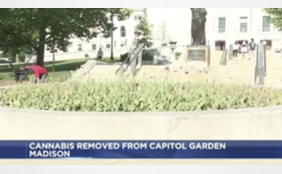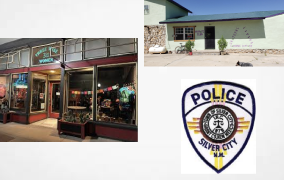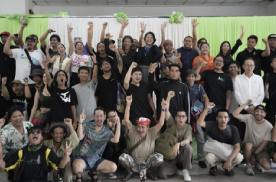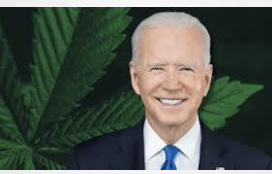European Union General Court ( “Court”) issued on December 12, 2019 in a case seen T683 / 18 in Resolution 1 “Cannabis in Amsterdam Store” trademark applications containing the phrase was rejected bulunarak contrary to public order.
The subject of the case before the Court is as follows; A woman named Santa Conte, residing in Italy, applied to the European Union Intellectual Property Office (“EUIPO” or “Office”) for the trademark you see and the image of which can be seen in the European Union on December 19, 2016. . Trademark applications, the Nice Treaty according to 30th in class “Cooked foods, bakery products, chocolate and sweets, salts, spices, flavorings and sauces; Ices, ice creams, frozen yogurts and sorbets; Search for hot pastry products.”, The 32 class ” Soft drinks; Beers and brewery products; Preparations for making beverages. ” and 43rd grade “Food and beverage supply services.”It is requested to be registered on. On 7 September 2017, the Office reviewing the application “defines non-discrimination” according to Article 7 (1) (b) of Regulation 207/2009 (“Regulation”) and Article 7 (1) (c) of the Regulation. It rejected it for “showing the geographical source from which the product came”. The applicant subsequently challenged this decision before the EUIPO Appeals Board on 9 October 2017. On August 31, 2018, the EUIPO Appeals Board found the trademark application “against the public order” in accordance with article 7 (1) (f) and rejected the objection by expanding the scope of the Office’s rejection decision.
The applicant then went to the Court against the decision in question. He argued that the leaves depicted in the trademark application in court were misunderstood by EUIPO and that they were free from clarity and impartiality in the grounds of EUIPO. He objected to the decision, arguing that the marijuana substance is a psychoactive substance derived from female cannabis flowers, not cannabis leaves, that the cannabis leaves do not contain the chemical that gives the marijuana a drug name, and that marijuana is not a plant name.
Upon these objections, the Court stated that in the evaluation of whether a trademark application is against public order, it is important how the relevant sector perceives the brand to be registered and an evaluation should be made in the light of the information available to the consumer. In the case in question, it was stated that the leaf shape in the relevant image could easily be compared to the marijuana, a drug by the public.
However, the Court has shown that, as the reason for the rejection of the trademark application, the widespread use of the mentioned marijuana substance in the goods and services desired to be registered and that the average consumer will think that the marijuana substance will be found in the products to be sold directly under this brand. The fact that the word “Cannabis” is written in capital letters and highlighted in the trademark application also increases the probability of being associated with the relevant marijuana substance, according to the Court. He also stated that the word “Amsterdam” refers to a city famous for the legal permission to sell marijuana products in “coffee shops” in Europe, which leads to the easy association of the marijuana substance with the trademark application.
The applicant stated that the expression of Amsterdam was used to show the origin of the cannabis substance, the non-drug cannabis content used in the products was imported from Amsterdam, the products sold in the said “coffee shops” did not sell similar products, and the related narcotic substance was mostly smoked. In response to this claim, the court did not find the objection, stating that the drug form of cannabis can also be consumed with drinks and food.
In the court evaluation, it was stated that while examining the criteria of non-compliance with the public order, both the attitudes of the member states of the European Union as a whole and each member state towards narcotic substances should be evaluated together. Stating that the public does not have detailed information about drugs in general, the Court has already had discussions in many member states regarding the legalization of THC-containing substances (the chemical component that gives marijuana its drug qualification). He said that what he would understand when he saw it should be evaluated and it would be appropriate to make a decision accordingly.
The court argued that the leaf image of the relevant plant in the trademark application, the words cannabis and Amsterdam should be evaluated as a whole, and that the possibility of associating these three elements with the relevant narcotic substance increases, since it contains too many references. In addition, in relation to the case in question, the Court stated that the use of narcotic substances derived from the cannabis substance in the member states of the European Union is forbidden, the fight against the spread of cannabis products is a very sensitive issue, and these approaches aim at protecting the general health of the people are essential for each member country. emphasizes that it is one of the values. Many Member States’ Stating that it is not possible to register this narcotic article, which is still forbidden in Turkey, and that the trademark application is against the public order, it confirmed the decision that rejected the relevant trademark application for all classes. In addition, the Court stated that the marks “COCAINE” and “CANNABIS STORE AMSTERDAM ORIGINAL AMSTERDAM”, which the applicant cited as a basis, and which are registered with EUIPO, cannot be claimed because their first-degree decisions are not binding for the Appeals Board or the Court.
Despite the fact that a certain amount of THC psychoactive substance is allowed to be used and sold in many European countries, the Court took a step that made it difficult to register a trademark containing marijuana or cannabis in the European Union.
The decision was made precisely when discussions about the legalization of marijuana are ongoing in the parliament of many European Union countries. For example, one of the current developments on this issue took place in Italy, where the applicant was also a citizen. As of January 1, 2020, it is accepted that weeds that contain THC, which is the active ingredient of cannabis, in the shops selling cigarettes and tobacco, can be traded in Italy, and now cannabis sales and consumption with a certain amount of THC are released in Italy. It has come.
The court delivered its decision on 12 December 2019. If the issue comes before the Court of Justice of the European Union, it is a question of how the decision will be made, whether the discussions and developments will be taken into account …
footnote
First published by IPR Navigator , in 27.01.2020
The content of this article is intended to provide a general guide to the subject matter. Specialist advice should be sought about your specific circumstances.



















